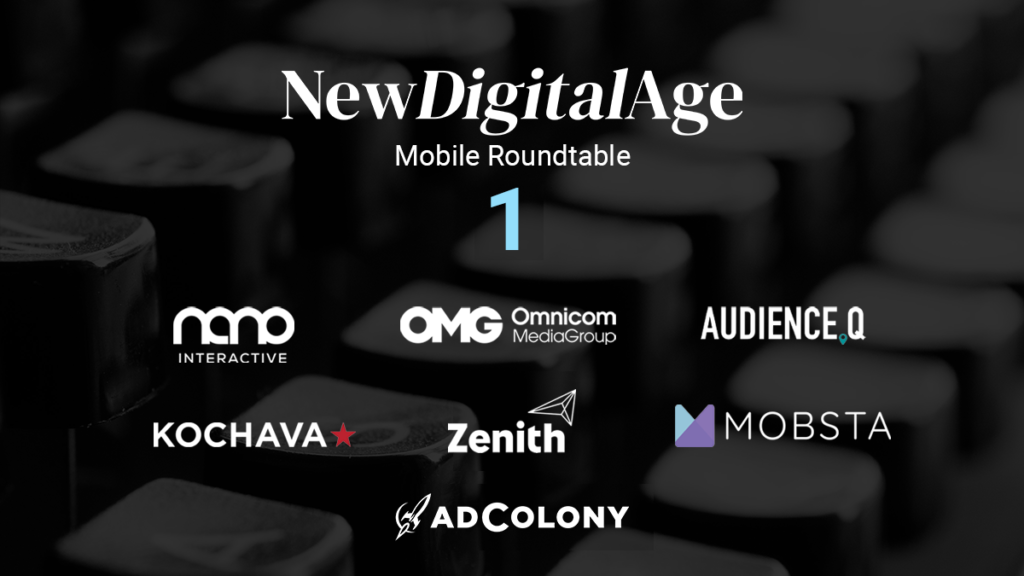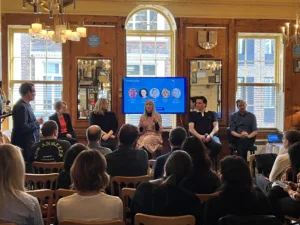Mobile has been steady and speedily growing in importance since even before the launch of the Apple iPhone back in 2007. With the ability to access online content on the go and download Apps and more it has risen to become our most personal ‘PC’.
Innovations and advances in technology have seemingly led to each year since labelled ‘The Year of the Mobile’ – but, according to a panel of mobile experts, it never was and nor will it ever be.
Instead, the ubiquitous mobile should be considered in the round, with marketers urged to leverage more of the benefits it offers both as an advertising medium and an enabler for every other part of a brand’s overall strategy.
New Digital Age Editor Justin Pearse brought together Niall Moody, Managing Director, Nano Interactive; Phil Rowley, Head of Futures at Omnicom Media Group (OMG); Ken Parnham, Co-Founder of AudienceQ; Natalie Carder, Head of Paid Social at Zenith Global; Charles Manning, CEO of Kochava; Will Dorling, UK Director of Sales at AdColony and George Dixon, Head of Product and Strategy at Mobsta to debate the changing mobile landscape.
For Rowley, it is all about the “tapestry of technologies coming in and out of focus, which should be used in conjunction with one another” rather than focusing on one part of the ecosystem to the exclusion of others.
Parnham concurs, saying that the phone is “just an enabler or a vehicle to get data from a person”. He calls for a more holistic approach to planning across channels and stresses the need to be more respectful to the end-user rather than being hamstrung by silos or the hype of one medium over another.
Carder agrees that mobile is more than an ad channel alone. She says that mobile has become such an important part of advertising touchpoints that it has become impossible to separate out the different channels because it is so intertwined.
It is becoming ever-more entwined, suggests Dorling, who says that the device evolves in tandem with consumer and societal behaviour. He says: “What brands are interested in is how people use their mobiles, and how they can make their brands relevant to their consumers and potential new consumers on that mobile, whether it’s in a game or using location data, or whatever else it might be. But as long as people are talking about mobile, that excites me.”
And evolve it has, with the panel agreeing that the Coronavirus pandemic has accelerated already-existing mobile trends. Carder says: “Last year was a very different year than what we expected and it really accelerated some of the transformation that was happening. We now need to focus on realising the importance of future-facing measurement and targeting strategies and understanding the role of mobile in commerce journeys.”
Manning believes the pandemic has proved a “triggering effect” for marketers. “It has been such an accelerant: people who were once dabbling in mobile for the purpose of just playing house in order to say ‘Yes, we do mobile stuff’, are finding that these things are real and deliver.” During the pandemic they have realised the full gamut of what mobile had to offer, he says.
That’s in part because consumers are using their phone more than ever – it is increasingly their first port of call for internet searches or app activity, but there is more to mobile than the content it serves.
As Dixon says, this is far more than an ad platform for brands: “At Mobsta we also leverage mobile data and we build insights from it. We use it as a measurement tool.
“Is it integral to everything in the marketing ecosystem?” he asks. “I think so, and it’s certainly here to stay. It’s becoming more and more crucial, as we leverage it in ways beyond just an ad delivery platform.”
He foresees that even in a post-cookie, post-device ID world that there is a huge amount of data that marketers and agencies can leverage in privacy compliant ways. “That could be location data or content consumption, understanding and leveraging different data sets available [in order] to see behaviour change, and then help use that to inform potentially mobile-focused campaigns.”
For instance, big anonymous operator data can be incredibly valuable, he says, citing Mobsta’s nascent relationship with Ericsson’s Emodo Supply division, verified by Three UK.
It’s all a part of how mobile is at the heart of everything in business and in life, according to Rowley. He predicts that within a decade the mobile could become the “omni-key to life – almost like the remote control that can do everything for you.”
Rowley points to China where mobile phone users are able to do anything from paying their gas bills to booking appointments, and mobile’s increasing role – over the past 10 months – as a method of enforcement for COVID contact tracing.
“Mobile will be so ubiquitous, containing the functionality of a control panel for everything that you want to do in life. That’s the zenith that I see us moving towards over the next five to 10 years,” he adds.
Moody already sees signs of this and cites advances in connectivity for recent leaps forward. “The mobile is now coming up to par with a computer,” he says. “We’ve had these brilliant devices in our hands, but have we always been able to connect to them across our network or to other aspects of our lives? If I think about how I use my phone today, I’ve looked for information, I’ve looked for news, I’ve looked for entertainment, and I bought something. And so all of a sudden we’ve had these really super, super intelligent devices that we probably haven’t really used to their full potential. As the connectivity catches up, you can see how that fits to – as Phil says – being almost a key to everything.”
Yet Dorling issues a note of caution: it is easy to categorise ‘mobile’ as one homogenous lump yet everybody uses their phones differently, meaning that marketers must be smarter about their overall mobile strategies.
With this, comes opportunity: “There is an opportunity for brands, with these different and changing behaviours. We’ve seen entertainment on mobile, app downloads and mobile gaming rising over the last 12 months because we’ve been looking for releases from lockdown and lockdown boredom. Those habits aren’t going to change when we go back to the new normal.”









